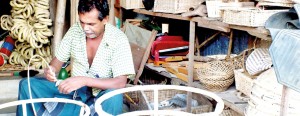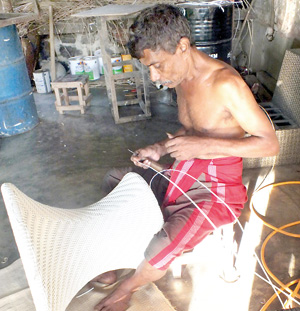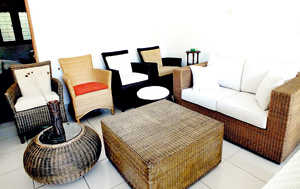Weweldeniya, Sri Lanka’s famous cane village, now a virtual ghost town
View(s):
H.A.Nimal making a chair.
WEWELDENIYA – Is Weweldeniya, the village made famous for cane furniture in Sri Lanka, losing its allure?
At some point or other, a sizable segment of Sri Lanka’s population would have purchased an item at the once- ubiquitous cane village on the Kandy-Colombo road, just near Cadju Gama (Cashew Village), either while passing-by or going there for that purpose. And who wouldn’t think of Weweldeniya for a piece of cane furniture when preparing to settle down or help a newly married couple?
Today, the townsfolk are struggling to eke out a living owing to a crisis precipitated by politics, imported cane furniture, cheap plastic furniture and shortage of raw material. Welweldeniya (known by villagers by its older name Radawadunna) is like a ghost town, having just 20 families from 1500 families many years ago.
P.K.P. Ariyaratne, Secretary, Radawadunna (Weweldeniya) Cane Craftsmen’s Associaton told the Business Times (BT) that there are more than 1,500 families and around 10 years ago the entire village was involved in the cane industry. Of the 1,500 families 1,000 families were directly involved.

Working on cane furniture.
Reminiscing on the past, he quipped, “There was bustling activity with a stream of cane shops and workshops on either side of the road. In the afternoons the entire roadside is full of people buying cane products and many vehicles are parked while the cane workshops sometimes work throughout the night”.
He pointed out that now only a very few shops are open and said there are no buyers, no bustling activity. The lingering death of this old industrial village is explained in one sentence made by Ms A.P. Chandranie , who runs one of the few cane shops that are open. “Api kaaleka indalaa edaa weila hambakaragena kanneth hari ammaruwen (Our earnings are extremely poor, making it very difficult to have a square-meal a day, for some time)”, she says, in a voice filled with anger, sadness and a few tears rolling down here cheek.
Seated on the floor of her shop, she scrapes a cane- rattan on her covered thigh on a piece of cloth with a special knife used for that purpose. She told the BT “There are no sales, because there is a glut of alternate substitutes of plastic ware in the market at very cheap prices. All craftsmen have found alternate jobs”.
Raising her work in anger and desperation, she said, “A few years ago there were 40 people working in our workshop but now our family members just manage to make a few items and it is indeed a big struggle to sell them. We know of no other job to live on and soon we would be rendered helpless.” She spoke of the difficulties in obtaining raw cane which has to be transported from places like Polonnaruwa, Ampara and Mannar only on a permit given by the government.

Cane furniture on display.
She was so disgusted and angry that she refused permission to the BT to take a photograph of herself, saying, “No. Any exposure in the newspapers or television could further speed the downfall of the industry”. Similar expressions of anger and frustration came from several other cane shopkeepers and craftsmen including H. A. Nimal, an expert cane craftsman who has a workshop but now runs a three wheeler taxi for a living and Sudath Chamara. They pointed out that though they find it difficult, the big timers bring in lorry loads of raw cane may be with political support and bribery.
Mr. Ariyaratne said that their society is failing as one by one the members are leaving. He believes the industry could be resurrected if politics doesn’t get in the way of a reasonable solution. Promises have been made in the past but not kept. “Now, we are doomed,” he noted.
On the flip side, Dinesh Ruwansiri, owner of ‘Ruwan Canewood Furniture’ runs a posh two storeyed, glass panelled cane furniture shop. He said that they have an extremely good market for their furniture and they supply to ‘elite’ – top level businesses like tourist hotels, etc. He said that they supply their exclusive cane furniture to ‘Amaya Hotels and have earlier supplied to the Jetwing group of hotels.
He said that an elegantly finished, custom-made exclusive 4-5 piece cane furniture set could be sold at Rs. 250,000. He said that they obtain raw cane locally and also import from Malaysia. There are 15 craftsmen working in his workshop, he said, adding that “price does not matter, if the product is of top quality.”
He attributed the slacking cane industry to short supply of raw cane, economic conditions of the people and to the import of finished cane products. He said that he has been in the industry for the last 15 years and the craftsmanship is ancestral and he has followed his father.


